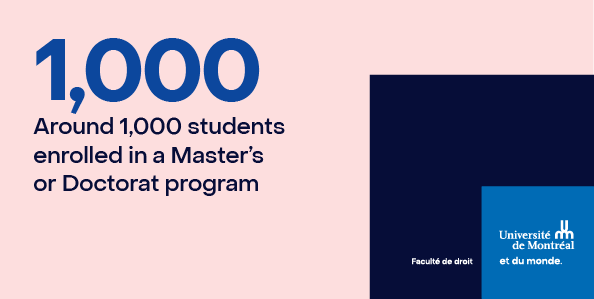Program Overview
Teaching law from a human perspective
The Bachelor of Laws program offers general studies in law, as well as preparation for further graduate or specialized studies or for various professional practices. The Bachelor of Laws program provides comprehensive and diversified legal training, enabling students to embark on a professional legal career or a career in which knowledge of the law is an asset.
The Faculty offers a first-year scholarship of $1,500 to college students who have an R Score of 35 or higher and to top university students—no application required. The scholarship is awarded in two instalments of $750 each, paid out once during the fall term and once during the winter term, provided that the student remains enrolled.
Admission and requirements
Visit the Université de Montréal website for a more complete description of the Bachelor of Laws program. For more information about how to apply to the program, consult the section “Guide d’admission et des programmes d'études”.
Pathways
Path type
Description and structure
Most students complete their undergraduate studies in three years (full time). The credits for this bachelor’s degree are as follows: 62 mandatory credits, 33-39 elective credits and a maximum of 6 optional credits.
Consult a typical path of a full-time student (in French)
Above and beyond excellence: Honours and International programs
1. Honours path
Recognizing excellence
The Honours program offers students the possibility of taking graduate-level courses during the third year of the program. This option encourages the best students to take their studies to the next level.
Students in the Honours program can replace up to four optional courses at the Bachelor level with graduate-level courses (including D.E.S.S. and Master level). However, enrolment in the Honours program is restricted to students who have, after the second year of study, maintained an average GPA of at least 3.7 (A-).
2. International Path
Pursuing international ambitions
The International program offers students a unique perspective on important international concerns. Thanks to its global law perspective, this path allows students to explore the challenges of an increasingly more globalized and interconnected world. Students having completed this program will have “International” mentioned on a distinctive diploma.
To enrol in this option, the student must have met the following criteria:
- Maintain an average GPA of at least 3.3
- Have passed the general course in public international law, as well as one course from the 70D Block
- Have either:
Completed a semester-long internship abroad in one of the Faculty’s institutional partners and have earned a minimum of twelve (12) credits, as well as a minimum of three (3) credits recognized by the Faculty as having international relevance;
or
Participated in a summer school session abroad and have earned six (6) credits that are recognized by the Faculty, as well as a minimum of nine (9) credits recognized by the faculty as having international relevance.
Practical Activities & Clinics
Plugged into the professional world!
The Faculty of Law offers a variety of practical activities designed to help students develop professional skills and prepare for the working world. These activities also enable students to acquire practical experience in a given specialized area and to grow within the personalized framework of a small group.
These activities are overseen by recognized experts from all legal contexts, including professors, litigation attorneys, notaries, litigation scholars, company executives and judges. Students can choose from a variety of learning activities, ranging from document and online research techniques to court simulations to participation in select national and international moot competitions.
Activities | Description |
Internship in the community | The Faculty of Law provides legal aid to some 30 organizations, which host more than 50 interns each year. Students, supervised by a professor, have the opportunity to apply their legal skills for the benefit of these organizations, which help women, immigrants and other citizens in crisis. |
Research internship with a judge | Thanks to an agreement with the Chief Justices of the Quebec Court of Appeal, the Quebec Superior Court, the Court of Quebec and the Montreal Municipal Court, the Faculty of Law can offer a limited number of students the opportunity to intern in the judiciary or with other judicial authorities. |
Practical Case Management Workshop | Entertainment law section: Commercial transactions section: This workshop introduces students to the practice of commercial law using concrete examples of commercial transactions.
|
Research and Writing Workshop | An activity to help students develop the ability to conduct legal research and to communicate their results in writing. This workshop teaches students how to orient and develop a research project and how to organize it in a coherent and logical manner, as well as presents them with an overview of substantive law. Writing work is supervised by the professor leading the workshop. |
Alternate Dispute Resolution Workshop | This workshop uses theoretical learning to help students acquire more concrete skills in the area of alternative dispute resolution, as well as to develop more skills in the area of ethics. |
Taking part in a tribunal hearing | Students may opt to undertake an in-depth study of the appeal of a (real or fictitious) court decision and produce a thesis, following the rules of the Quebec Court of Appeal, addressing all legal aspects of the case. |
Taking part in the Legal Aid Clinic | Students may obtain an internship in the Faculty of Law’s Legal Aid Clinic. These internships allow students to work on practical legal questions, under the supervision of experienced jurists. |
Combined Programs
Challenge yourself intellectually!
Students with an undergraduate university degree who have accumulated 65 credits in Bachelor of Law courses and who fulfill the eligibility requirements for graduate studies may obtain a graduate degree at the end of their third year of study by simultaneously earning a Bachelor of Law during that same year.
Conditions of admission:
Have a Bachelor degree in another discipline. Before starting graduate studies, have accumulated at least 65 credits in the Bachelor of Law department (that is, 35 credits from Block A and at least 21 credits from Block B) and have earned an average GPA that meets the eligibility criteria of graduate studies (2.7 or 3.0, depending on the selected program).
Potential Bachelor degree combinations :
In summary
- R Score : see admission site
R Score - 101-credit program
- Full time
- Three-year degree
- First Nations, Inuit and Metis candidates from Quebec and Canada












